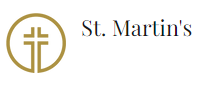Holy Communion
The Most Blessed Sacrament of the Altar, Holy Communion, is the Sacrament by which Jesus Christ continues to be present with us. We believe that the consecrated bread and wine truly are the Body and Blood of Christ- but we Anglicans are not so concerned about how that happens. We are content to celebrate the mystery of this work of the Holy Spirit.
The ancient Church taught that Holy Communion is the Medicine of Immortality: as we feed on Christ, we receive the forgiveness of sins, find peace and healing, and are made more and more to be the Body of Christ in the world.
The Sacrament of Holy Communion assumes a person is baptized (that is that they have already been joined to Christ in the sacrament of new birth), but we celebrate an open table at St. Martin’s- which means that anyone who feels drawn to the love and grace offered by God in this Sacrament, are welcomed to receive it.
